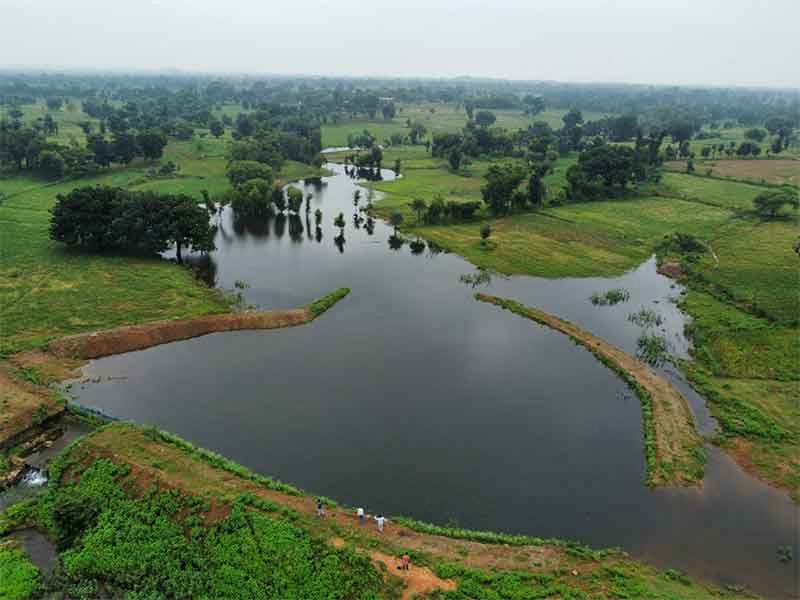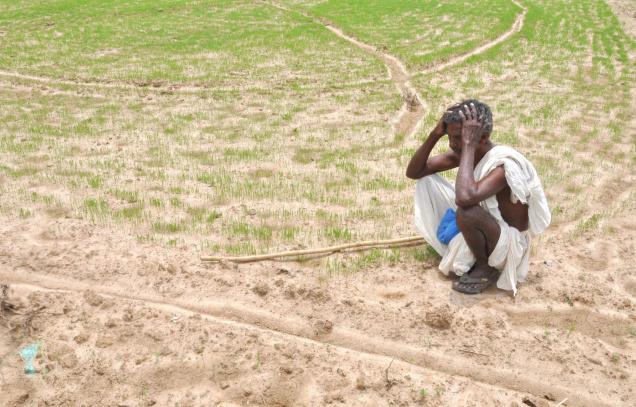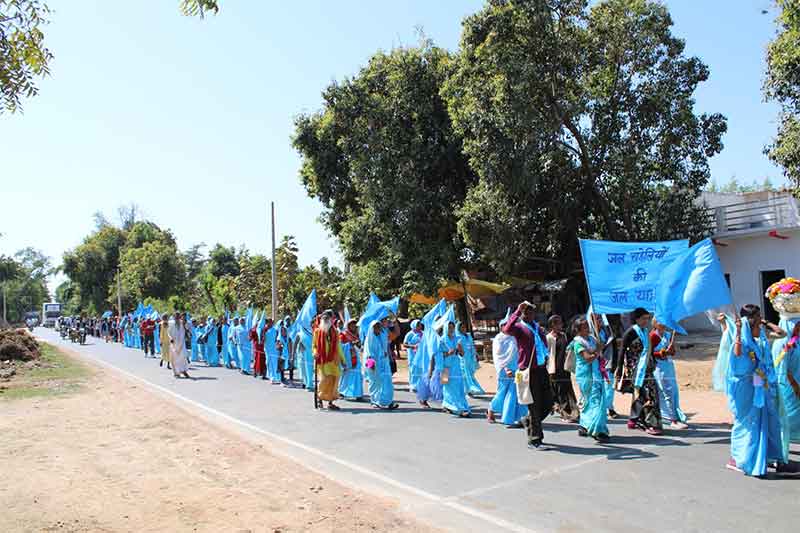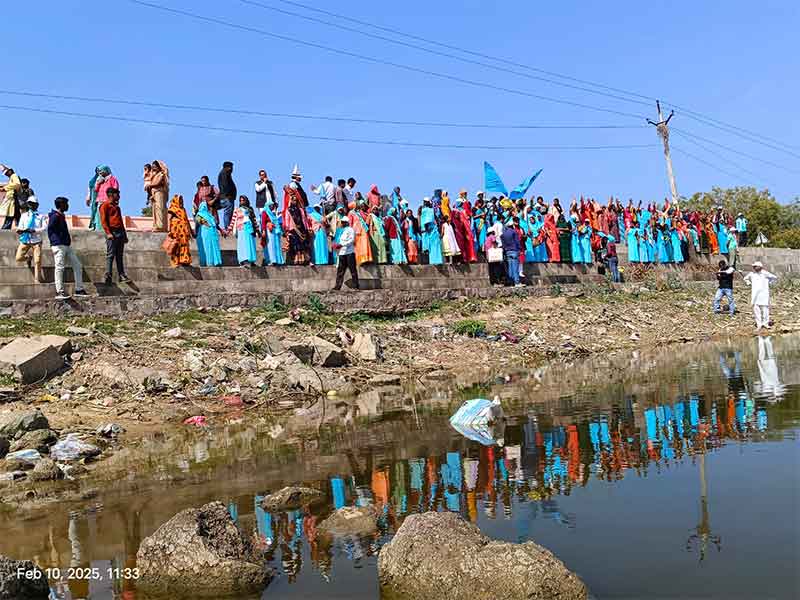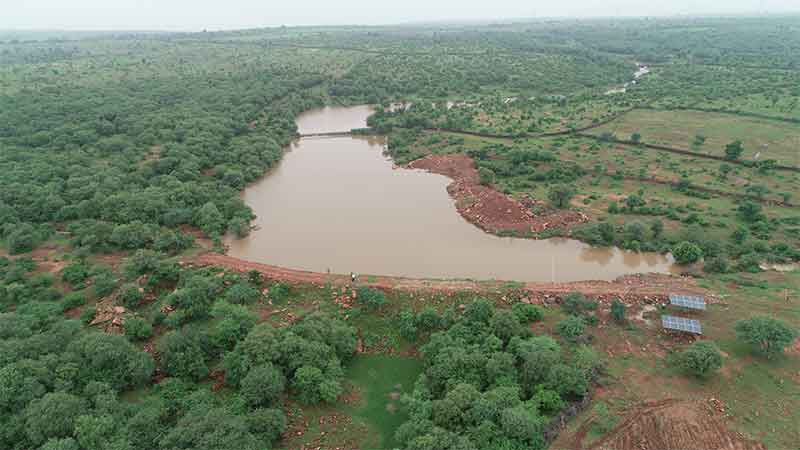
In the arid and undulating landscape of Rajasthan, this village stands out like a green oasis. Teen Pokhar, with a little over 48 households, is a drought-proof village one hour away from Karauli district, Rajasthan. What makes it so special is the fact that it has been able to revive traditional water harvesting structures to conserve rainwater.
Five years ago, Teen Pokhar village, situated in the Dang area of Karauli district, was facing acute water scarcity. Chorji, a resident of the village, recalls, “The tough topography of the village deprived us of fundamental services such as health, education, roads, electricity, and drinking water. Due to the high scarcity of water, crop yields were very low, with average paddy production being only 1.5–2 quintals per bigha.”
Chorji, like other farmers in the village, had a piece of land but was unable to do anything with it due to its infertility and the acute water shortage. He was not the only one in the village facing this problem. All the other farmers also endured similar adversities. Gradually, people began migrating to cities like Chennai and Ahmedabad to work in tile and marble factories or took up jobs in stone mining.
The villagers eventually approached different NGOs working in nearby villages. A committee was formed, and a plan was laid out. SRIJAN, along with other NGOs, worked in the village on Natural Resource Management and Climate Resilient Agriculture. Existing structures were renovated, and new ones were constructed. Field bunding further ensured that barren land was turned into cultivable land.
With the support of SRIJAN, Chorji renovated a pokhar (traditional water body) to conserve rainwater and started farming on his land. His crop yield increased manifold, and his life turned around. He could feed his family three meals a day, save money for his children’s education, and earn through livestock rearing. Earlier, the land was barren and of no use. The fields were infertile, and only animals grazed there. The expenditure on cultivation was way beyond the income, and crops would often fail. Each family owned about 20–25 cattle, but with wells drying up, there was no water even for the livestock.
Today, residents of Teen Pokhar proudly state that there are more than 50 structures in the village for harvesting rainwater. Water availability has increased significantly, and the villagers are no longer dependent on the monsoon. They now cultivate crops even in the Rabi season.
Chorji shares, “Now, we can harvest crops like wheat and pearl millet, with yields reaching thousands of kilograms annually—something that was impossible earlier. There has also been significant growth in water levels, rising to 24 feet. The pokhars even withstood excessive rainfall beyond expectations.”
The impact has been transformative. The farmers in this village are now happy and enthused, having significantly increased food production over the last four years. The biggest contributing factor has been the creation of several new ponds and water sources, as well as the improvement of existing ones with the help of voluntary organizations like SRIJAN.
Geeta Bai, a woman from the village shares, “I had earlier never seen rice and wheat cultivated on my farm, and now we are growing wheat, mustard, gram, and vegetables. The productivity of the kharif crops, which earlier entirely depended on rainfall, has also improved.” Sarupi, another woman, adds, “Earlier there was hunger in this village. We didn’t even have enough to meet our basic food needs and had to purchase wheat from the market. But now, we are meeting our needs and earning good income from sales of farm produce too.”
Education is no longer a dream for the children, and families can now manage to save money. Children have started going to school and are even pursuing higher education. Earlier, not a single family in the village was educated. The villagers have also started milking their cattle and earning profits.
The farmers of Teen Pokhar were already practicing natural farming to some extent, but their interaction with SRIJAN has further emphasized its importance. They now cultivate their crops using sustainable practices with minimal dependence on chemical fertilizers. Farmers produce bio-inputs on their farms, as the large number of livestock ensures a steady supply of dung and urine.
Although the productivity of the farmers has increased, they are still dependent on traders when it comes to selling their goods. In return, they do not get the right price, which is always lower than the mandi rate. The traders take advantage of this situation. To overcome this problem, the farmers have become shareholders of Dangvikas Farmers Producers Company Limited, an FPO promoted by SRIJAN in the Karauli district of Rajasthan, so they can get better rates for their mustard crop.
Subscribe to Our Newsletter
Get the latest CounterCurrents updates delivered straight to your inbox.
Additionally, the farmers are now more aware of government schemes and sustainable technologies like pipes, sprinklers, and solar pumps. They have begun adopting efficient technologies and shifting to renewable energy sources, utilizing sprinkler and pipe irrigation systems to maximize efficiency.
Uday Kumar Saw is a Project Executive at Self-Reliant Initiatives through Joint Action (SRIJAN), where he focuses on bringing sustainable change to rural communities. He holds a Master of Arts in Social Work, specializing in Social Development, from Jamia Millia Islamia University.

